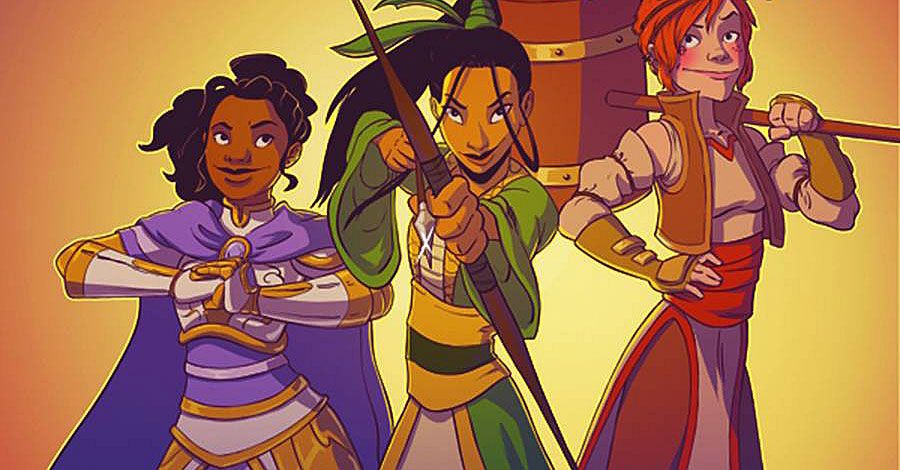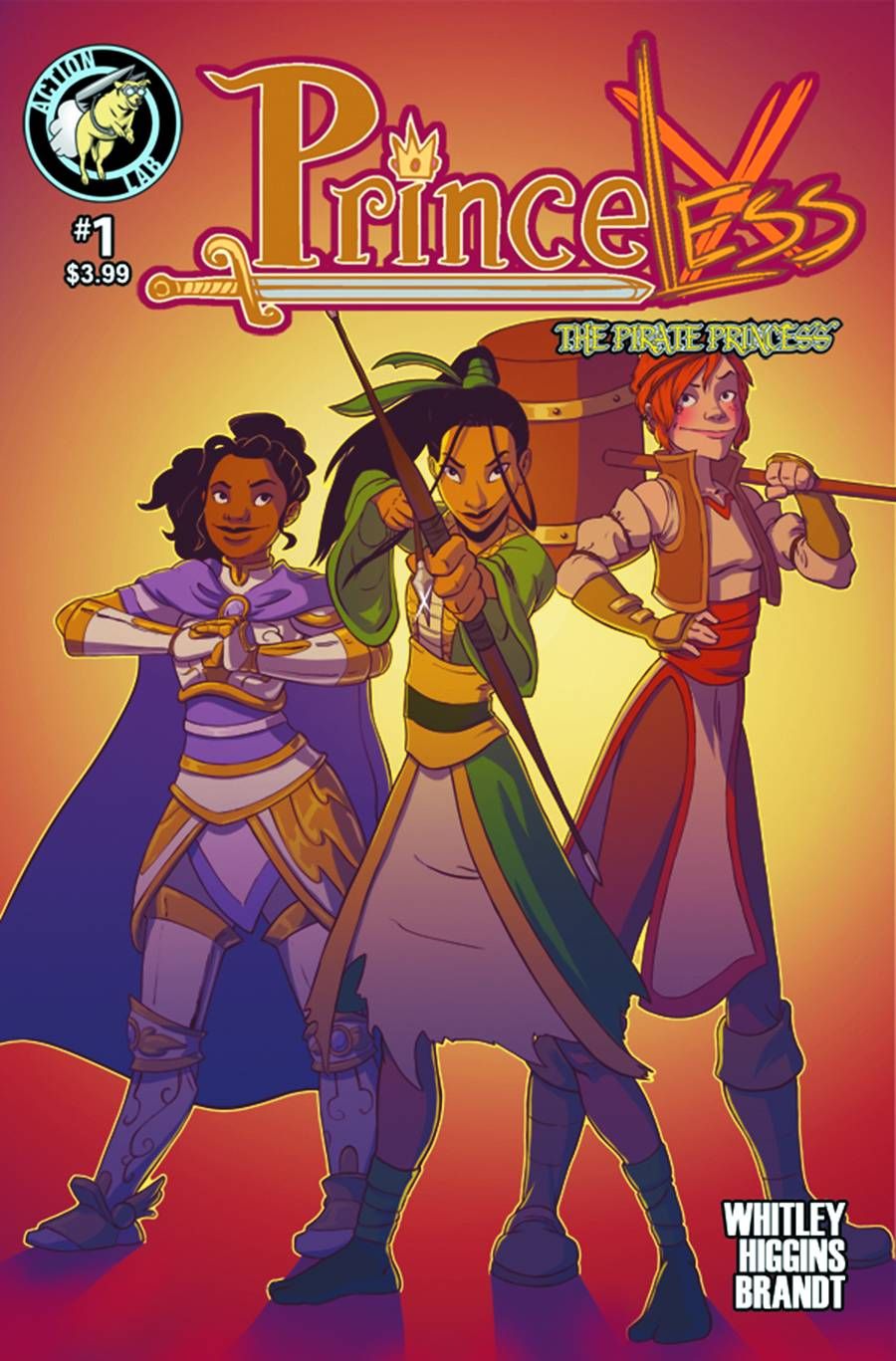Though it arrived under the #BlackComicsMonth banner, New York Comic Con's "Diversity In Comics" panel involved issues related to gender, disability, sexuality and more, drawing on the perspectives of creators with a range of experiences. The panel, moderated by Dean MizCaramelVixen, featured "Batman" writer Scott Snyder, "Genius" artist Afua Richardson, "Princeless" writer Jeremy Whitley, "Cyborg" and "Power Man and Iron Fist" scribe David Walker, "Midnighter's" Steve Orlando, "Cash and Carrie" creator Shawn Pryor, "Swords of Sorrow: Miss Fury & Lady Rawhide" writer Mikki Kendall, "Agents of the Realm" creator Mildred Lewis, "The Walking Dead's" Chad Coleman, and BOOM! Studios Brand Communication Manager Christine Dinh.
After a loud round of applause for the recent announcement of Walker's "Power Man and Iron Fist," Vixen asked the panelists, "What does diversity mean to you?"
Richardson began by talking about her series "Genius," about a teenage tactical prodigy in Los Angeles who is "breaking down the gangs, because fighting each other is stupid," and taking down corrupt cops while she's at it. "Literally, this book came out a three days before the events in Ferguson," She said, which only added to the resonance of the book's themes.
Defining diversity as "a proper representation," Richardson said it was important to comics in particular because "a lot of people get their ideas about society from fiction."
Dinh said she was proud to work with BOOM! Studios to publish "books that represent the world that we live in." She specifically cited "Lumberjanes" as a series portraying young girls in a realistic manner. "It's taken a while for mainstream publishers to catch up and realize your audience is not who you think they are."
Whitley said he wrote "Princeless" so his daughter, "who is a young woman of color," could see herself represented in comics, something which was all too rare. "I want her to be able to read comics and enjoy comics as I do, and I've never had trouble finding myself there [as a white man]."
Kendall's first comic was published last month, "Swords of Sorrow: Miss Fury and Lady Rawhide." "Just remember, you opened the door to this soapbox," she began. "We tend to frame diversity as if it is a response to the default whiteness. And when you teach a people that they are not normal because of how they are born, you dehumanize them. I don't know about the rest of you, but I'm pretty damn sure that I'm human."
She, too, said she "wanted her sons to be able to see themselves as heroes." "'Static Shock' was my son's favorite thing in the world, and we could not find merchandise. If they are not going to make it for us, we're going to have to make it for ourselves."
Coleman, best known for his role as Tyreese on "The Walking Dead," spoke about his forthcoming project "Treadwater." He said the graphic novel series would see "many different people from many different walks of life, their stories being told."
"Diversity isn't just about race, it's not just about the color of your skin," Vixen said at this point. "It's disability, mental illness, sexual orientation --"

"Any time there is blatant exclusion," Coleman added.
"If y'all follow me on Twitter, you know I had a panic attack at 1 in the morning that nobody was going to come to the panel. It turned out not to be real, but at the time, it was everything," Vixen continued, mentioning her own struggles with depression and PTSD.
She also spoke about a relative who had tried to kill herself. "I gave this relative one of Scott's comics and -- she wasn't okay, I'm not here to testify, but comics helped her get out of her funk."
Snyder said, "It's crushingly intimidating writing these characters -- and you feel like anything you write isn't going to be good enough. More than that, depression can make a person believe all the worst thoughts about themselves. "Comics, for me at least, has been a way through those times when I get really really dark," and the heroes can be an inspiration.
Richardson compared it to "sometimes that song says exactly what you need to hear," and that, after her family broke up in her teen years, "drawing characters on the subway was what saved me."
"I think the psychological permission is what's lacking," Richardson said of would-be creators' obstacles to making comics.
Kendall said it is important to be able to "escape to a world where you exist," because without it, "you wonder if you have a right to be here." "I had books that I loved, but no stories about people like me," she said, adding that this was her inspiration to create them. "If you can't find a character like you in a book, I'm serious: Write one. Put yourself out there because you will help someone else, and you will help yourself."
Pryor next spoke about his time as president of Action Lab. "That was my first time being in the game. And the game is cold blooded," he said, referring to the comics industry. "It's cold blooded for everybody, but -- and don't get offended when I say this -- being the only brother, a chocolate chip in a sea of milk, makes it harder."
After "the game" wore him down, he took a year off and returned as a creator, Kickstarting "Cash and Carrie." "It kind of gave me hope again."
"We can do more than just draw," Vixen said, citing Marvel's hip-hop covers with a degree of skepticism.
Walker, a frequent guest of diversity panels, said, "I'm tired of talking about this." But a friend told him, "The truth is always new to someone."
He then brought up Ahmed Muhammed and envisioned a world where "a brown kid who happens to be Muslim is not thought of as a potential terrorist, but a really bright kid." To that end, Walker will keep participating in this sort of panel.
"Diversity is not a marketing tool, it's not a strategy. It's how we see other people," he said. "It's about every one of us reclaiming our humanity."
Richardson defended Marvel's hip-hop covers, noting that an early article incorrectly said no people of color worked on them. In addition to Sanford Greene, who was one of the first creators announced, she said, "I worked on one of those covers, Brian Stelfreeze worked on one of those covers," in addition to several others.
Pryor said his problem was with the launch, noting that of the first batch very few were by people of color. "When you present something like hip-hop, that is everywhere, but in the beginning, its main target audience -- it was off," he said, adding that he had other issues that "would take way too long to get into it."
Orlando spoke about "Virgil," his "queersploitation" comic about "an outed cop fighting his way across an island to save his man." This, too, came partially as a result of a lack of gay action heroes. He reiterated that part of representation requires building up characters around the protagonist, because just dropping one character in tends to be "pandering" and "doesn't represent anybody's experience."
Louis said "Agents of the Realm" came as a result of "being impatient for 'Sailor Moon Crystal' to come out." The project became serious, though, out of a need more black female comics teams.
Kendall's advice to aspiring creators was that networking is not just the con floor but "the con bar, the con restaurants." "Don't be afraid to put yourself out there," she said. "The worst they can do is say no."
Orlando spoke about the catch-22 of having diverse characters "that matter" (i.e., that have a long history) versus "fundamentally changing a character that is 75 years old." "It's a tightrope that is challenging," he said. "I think we just need great characters -- creating new characters that can contend is amazing, but right now it's a huge challenge to do."
"There's no lack of diversity [in comics]; we're just not talking about it," Walker said, citing "Agents of the Realm" and "Concrete Park" as just two of many examples from the independent comics scene "There's nothing lazy about [making Ms. Marvel Pakistani]. G. Willow Wilson is writing her ass off on that book. What's lazy is nobody talking about 'Concrete Park.'"
"The first issue of 'Princeless' sold seven hundred copies. That would have been cancelled immediately by any of the major companies," Whitley said. Action Lab's scale gave it room to grow, but at the Big Two, "you need a giant thunderbolt on the front that says 'Ms. Marvel.' Otherwise, it wouldn't be there."


